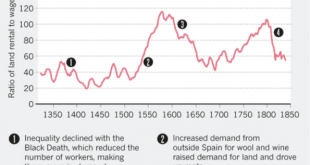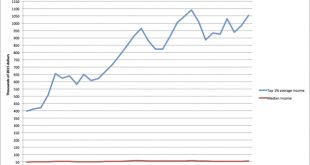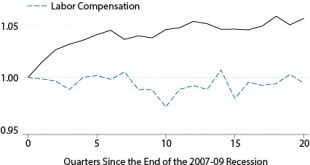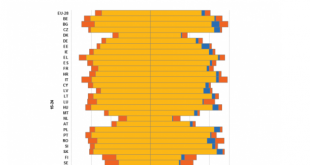from David Ruccio We can thank Donald Trump for one thing: he’s put the white working-class on the political map.* In recent months, we’ve seen a veritable flood of articles, polls, and surveys about the characteristics, conditions, and concerns of white working-class voters—all with the premise that the white working-class is fundamentally different from the rest of non-working-class, non-white Americans. But why are the members of the white working-class attracting so much attention? My...
Read More »Inequality: the very long run
In Nature Branko Milanovic published an interesting article about (very) long run cycles in inequality, using among other metrics the wage-rent quotiënt as an indicator of inequality (wage income relative to income of landowners). See the first graph. I can actually add a little to this. I’ve extended the Dutch (Frisian) wage/rent series published earlier on this blog backward to 1697 and forward to 1862 (below). Up to about 1800, developments in Friesland and Spain seem to be pretty...
Read More »Liberal trickledown economics
from David Ruccio Has the policy consensus on economics fundamentally changed in recent years? To read Mike Konczal it has. I can’t say I’m convinced. While some of the details may have changed, I still think we’re talking about different—liberal and conservative—versions of the same old trickledown economics. But first Konczal’s argument. He begins with a pretty good summary of the policy consensus before the crash of 2007-08: Before the crash, complacent Democrats, whatever their...
Read More »How unemployment has been considered by mainstream macroeconomic models?
from Maria Alejandra Madi From the 1950s onwards, the macroeconomic models of the neoclassical synthesis, based a system of simultaneous equations, focused on the interaction between the market for goods and services and the money market in the context of a general equilibrium analysis. According to John Hicks (1904-1989), in the general case, the capitalist economy is at full employment level of output. The underlying employment theory is based on the demand and supply of labour in a...
Read More »Hold the champagne
from David Ruccio Last week, to judge by the commentary on the latest Census Bureau report, Income and Poverty in the United States: 2015 (pdf), you’d think the fountain of broadly shared economic prosperity had just been discovered. Binyamin Appelbaum is a good example: Americans last year reaped the largest economic gains in nearly a generation as poverty fell, health insurance coverage spread and incomes rose sharply for households on every rung of the economic ladder, ending years...
Read More »Phlogiston, the identification problem, and the state of macroeconomics
from David Ruccio The other day, I argued (as I have many times over the years) that contemporary mainstream macroeconomics is in a sorry state. Mainstream macroeconomists didn’t predict the crash. They didn’t even include the possibility of such a crash within their theory or models. And they certainly didn’t know what to do once the crash occurred. I’m certainly not the only one who is critical of the basic theory and models of contemporary mainstream macroeconomics. And, at least...
Read More »Mind the gaps: compensation and productivity (3 graphs)
from David Ruccio According to the norms of both neoclassical economic theory and capitalism itself, workers’ wages should increase at roughly the same rate as their productivity.* Clearly, in recent years they have not. The chart above, which was produced by B. Ravikumar and Lin Shao for the Federal Reserve Bank of St. Louis, shows that labor compensation has grown slowly during the recovery of the U.S. economy from the 2007-09 recession. In fact, real labor compensation per hour in...
Read More »The anniversary of Lehman and men who don’t work
from Dean Baker Last week marked the eighth anniversary of the collapse of Lehman Brothers, the huge Wall Street investment bank. This bankruptcy sent financial markets into a panic with the remaining investment banks, like Goldman Sachs and Morgan Stanley, set to soon topple. The largest commercial banks, like Citigroup and Bank of America, were not far behind on the death watch. The cascade of collapses was halted when the Fed and Treasury went into full-scale bailout mode. They lent...
Read More »Are young men only watching porn nowadays? Not in Iceland (were they have jobs)
In the USA there is an amusing discussion going on about the decline of the participation rate of (young) men. some people state that this might be caused by digital amusement. Dean Baker rightly points out that we should not restrict this discussion to American not yet dad’s. I want to make the case that we should not even restrict this discussion to the USA. Below three graphs (source: Eurostat) which show that: A) The average participation rate in Europe increased, even after 2008 (the...
Read More »Rising tides and marginal productivity theory
from David Ruccio A constant refrain among mainstream economists and pundits since the crash of 2007-08 has been that, while the state of mainstream macroeconomics is poor, all is well within microeconomics. The problems within macroeconomics are, of course, well known: Mainstream macroeconomists didn’t predict the crash. They didn’t even include the possibility of such a crash within their theory or models. And they certainly didn’t know what to do once the crash occurred. What about...
Read More » Real-World Economics Review
Real-World Economics Review




